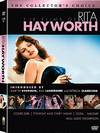





Myrna Loy
Awards | Article | Downloads | Links | Image Credits | THE BEST YEARS OF OUR LIVES
| Page 2 |
|
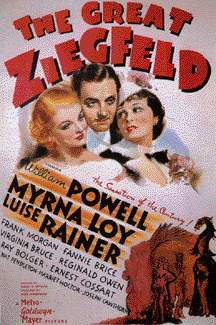 In
the most prestigious production of her career to date, Loy plays
Billie Burke, the second wife of famed Broadway
impresario Florenz Ziegfeld, in MGM's
lavish, star-studded biopic THE GREAT ZIEGFELD
(1936). Starring
William Powell in the title role and Oscar-winner Luise Rainer as
Ziegfeld's first wife, stage star Anna Held, the film won the Academy Award as
the Best Picture of 1936, and also features such legendary Follies personalities
of the 1910s and '20s as Fannie Brice, Harriet Hoctor and
Ray Bolger. Despite the
billing order, Loy's role is definitely secondary to those of
Powell and Rainer. Nevertheless, it illustrates the
ever-increasing regard in which her home studio now held her. In
the most prestigious production of her career to date, Loy plays
Billie Burke, the second wife of famed Broadway
impresario Florenz Ziegfeld, in MGM's
lavish, star-studded biopic THE GREAT ZIEGFELD
(1936). Starring
William Powell in the title role and Oscar-winner Luise Rainer as
Ziegfeld's first wife, stage star Anna Held, the film won the Academy Award as
the Best Picture of 1936, and also features such legendary Follies personalities
of the 1910s and '20s as Fannie Brice, Harriet Hoctor and
Ray Bolger. Despite the
billing order, Loy's role is definitely secondary to those of
Powell and Rainer. Nevertheless, it illustrates the
ever-increasing regard in which her home studio now held her. |
|
In LIBELED LADY (1936), Loy plays a rich, no-nonsense society girl who sues a newspaper for libel when it prints a story impugning her reputation. After the paper's editor (Spencer Tracy) sets out to dig up some real dirt on her and can't find any, he hires Powell to infiltrate her social circle and create a compromising situation. But Loy isn't easily compromised. Although Powell wins most of the laughs in this Best Picture-nominated romantic comedy, Loy creates the most credible character in the film. Under her guidance, Connie Allenbury evolves from a wary, standoffish ice princess into a charming, playful and even touchingly vulnerable woman. |
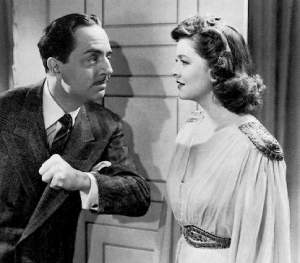 By the 1940s, after having played opposite each other so often in films, audiences came to expect Powell and Loy to get together before the final reel. As a result, their more typical boy-meets-girl romantic comedy plotlines evolved into comedies of remarriage -- similar to such classics as THE AWFUL TRUTH (1937), THE PHILADELPHIA STORY (1940), HIS GIRL FRIDAY (1940) and MY FAVORITE WIFE (1940) -- in which the leads begin the film as a married or recently-divorced couple whose often-sexually-charged relationship goes humorously on the rocks before those whom God hath joined together are reunited. I LOVE YOU AGAIN (1940) features Powell as an amnesia victim who finds himself reunited with a wife (Loy) and life as a small-town civic leader, all of which he has completely forgotten. In LOVE CRAZY (1941), Loy and Powell play a married couple who come to suspect each other of infidelity on their otherwise blissful fourth anniversary. As in most of their films, Powell's zany antics (even to the point of cross-dressing) are the fun-loving heart of these comedies of remarriage, but Loy's ability to play the straight-man -- reacting both humorously and straight-faced -- keep Powell's clowning credible and contribute an essential element to the fine balance these otherwise over-the-top films achieve. |
| Now in Print! |
|---|
| Now on DVD! |
|---|
Buy Videos & DVDs |
|
Buy Movie Posters |
|
Buy Movie Posters |
|
Classic
Movie Merchandise |
|
![]() Printer-friendly version.
Printer-friendly version.
![]() Return
to the top.
Return
to the top.
Last updated:
March 10, 2011.
Reel Classics is a registered trademark of Reel Classics, L.L.C.
© 1997-2011 Reel Classics, L.L.C. All rights reserved. No
copyright is claimed on non-original or licensed material.
Terms of
Use.




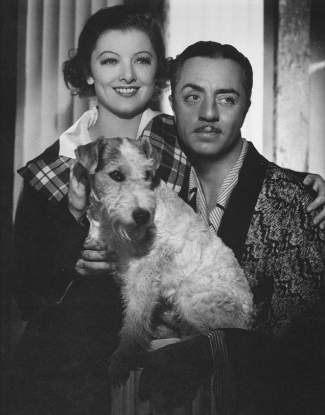 Her
films with
Her
films with 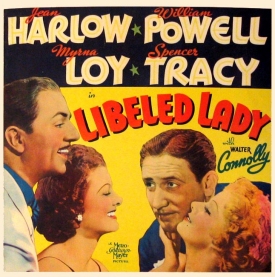 In
addition to her six THIN MAN movies with
In
addition to her six THIN MAN movies with 
